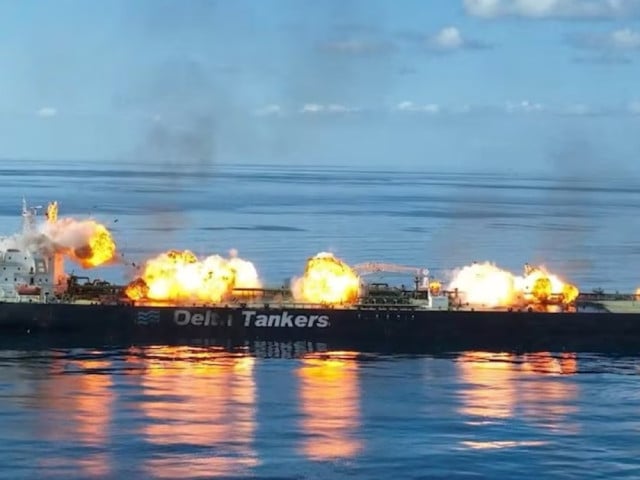ATHENS:
As salvage operations began on an abandoned Greek-flagged oil tanker with deck fires still burning from Houthi rebel attacks, the EU’s Red Sea naval mission Aspides said on Thursday that no oil spill has been detected.
Yemen’s Houthi carried out multiple assaults, including planting bombs on the already disabled 900-foot (274.2-meter) Sounion that is laden with about 1 million barrels of oil. On Wednesday, the Iran-aligned militants said they would allow salvage crews to tow the ship – which has been on fire since Aug. 23 – to safety.
“It would appear, at least for now, that cooler heads prevailed,” Lars Jensen, CEO of industry consultancy Vespucci Maritime, said on LinkedIn.
The Houthis have sunk two vessels in their 10-month drone and missile campaign against commercial shipping in the Red Sea and Gulf of Aden. The attacks are in solidarity with Palestinians in the war between Israel and Hamas in the Gaza Strip and likely will continue if a ceasefire is not reached.
The EU mission vowed to “facilitate any courses of action” in coordination with European authorities and neighboring countries to avert a catastrophic environmental crisis and rescue Sounion.
On Thursday, Pentagon spokesperson Sabrina Singh said the barrels of crude oil on the Sounion were intact, that the vessel itself was leaking some oil from where it was hit, and that multiple fires were still burning.
The Houthis’ decision to grant rescue crews safe access to the Sounion came after multiple countries voiced humanitarian and environmental concerns. The move may help avoid what experts warned could be a devastating spill of 150,000 tonnes of crude oil into the Red Sea.
A spill of that volume would be more than half the size of the largest ever recorded from a ship – 287,000 tonnes from Atlantic Empress in 1979, according to the International Tanker Owners Pollution Federation.
Despite the respite in hostilities, risks to crew members, vessels and the environment from Houthi attacks remain.
“Even if the (Sounion) can be towed away and we avoid an environmental disaster the threat has not disappeared,” Jensen said, adding that there are dozens of oil tankers and other merchant ships still operating in high-risk areas of the Red Sea and Gulf of Aden.







